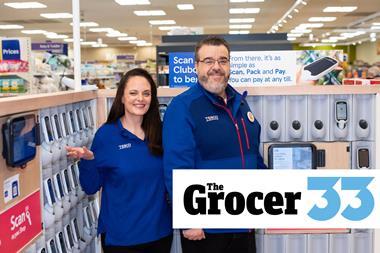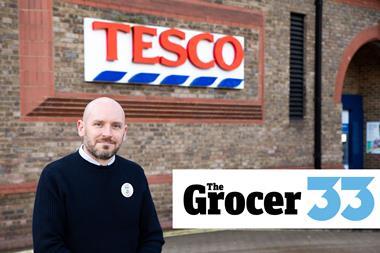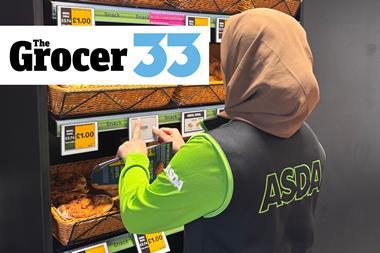All grocery businesses face pressure – as do their staff. So as awareness of mental health issues in the workplace improves, what are they doing to help? And how can they do it better?
It took Alex blacking out and falling down a flight of stairs to seek help. A marketer at a food startup, she’d been having nightmares, struggling to sleep and lost her appetite. Diagnosed with stress-induced anxiety, the cause, she says, was her job. “My anxiety had been pretty bad since I’d been there. I was thinking about work constantly as the pressures were so high.”
Now in a new role, where she feels far better supported, she says her experience made her realise how prevalent mental health issues in grocery are. “It isn’t really spoken about but you only have to ask your colleagues when was the last time they had a good night’s sleep or when was the last time they didn’t shudder about work at the weekend for you to realise you’re all in the same boat.”
Mental health in grocery is a topic that could not be more germane, with both instances and awareness on the rise among UK workers and companies.
In 2017, Business in the Community’s annual Mental Health at Work study highlighted fmcg and retail as areas of particular interest. It found 32% of people working in fmcg had been diagnosed with a mental health condition, above the national average of 31%. For those in retail, the figure rises to 36%. That is a “sizeable minority of employees” said the authors.
“My anxiety had been pretty bad since I’d been there. I was thinking about work constantly as the pressures were so high”
“There’s more pressure in grocery retail than there’s ever been,” warns Dr Kavita Deepak-Knights, a chartered clinical psychologist at Cardinal Clinic in Windsor. Small grocers are being forced to work longer hours to survive in an increasingly competitive market, while supermarket managers “are massively pressured” by targets and responsibilities towards their “huge” workforces, she says. Indeed, 31% of retail managers in the same study said performance targets were a significant barrier to managing mental health.
On the shop floor, potential triggers of stress, anxiety and depression include long hours, repetitive physical tasks and belligerent customers. “Employers are demanding more for less,” adds Deepak-Knights. “There’s the pressure of stock rotation, the pressure of customer service - and sometimes you have people who don’t have the social skills needed for the job.”
For Richard Jones, CEO of Grocer Global Group and the founder of GreenStone Professional, a mental health support service, commercial teams in fmcg are often at risk too, with stretching financial targets, he points out. Then there are shift workers. “We see a lot of issues where people are working ‘four on, three off’ patterns and can’t have a regular family life because of how the shifts fall.”
So, against this backdrop, are grocery employers doing enough to support their staff?
Case study

Dan is a commercial manager for a supplier of ambient grocery products.
In a previous job, he was stricken by anxiety and depression due to the behaviour of a former managing director.
“This individual was a control freak, unwilling to give his employees the freedom to think, speak or act - often treating his employees with so much anger and hatred that they had been left in tears.”
Dan found he had “no other alternative than to seek medical advice” and was prescribed sleeping pills and beta-blockers. After taking time off sick, he decided not to return to his job. Now in good mental health, his experience taught him a powerful lesson, he says.
“Going from being a person who I considered to be strong and resilient to a nervous wreck, unable to leave the house for two to three weeks, I am so much more aware of the only way to help: it is through support, understanding and acceptance by others.
“In our industry, we have a due diligence to recognise and support anyone who suffers any form of mental illness. It may be a simple chat, or a more broadened and in-depth support plan that is required - but until all leaders in our industry take the time to understand what the problems are, we can never start to understand the solutions.”
Across the 10 leading supermarkets, the sector’s biggest employers, there is outwardly a raft of programmes and services dedicated to ensuring support is available.”The health and wellbeing of our colleagues is one of our top priorities as an HR function,” says Co-op health wellbeing manager Paul Caudwell. “It’s vital our colleagues feel healthy, motivated and at their best.”
Sainsbury’s aims to be “an inclusive retailer, where all colleagues can “fulfil their potential. As a large business, we are committed to taking an active leadership role in society to help develop initiatives that support our colleagues and enhance their sense of wellbeing.”
Suppliers too are stepping up their internal programmes. At Pladis, the suicide of a staff member prompted the creation of its support programme Positive Minds in 2017, for example. This provides line managers with training in how to understand, detect and support mental health issues. “For us, it’s about the national conversation,” says Jonny Jacobs, its director of strategy & transformation and lead sponsor of the initiative. “We genuinely want to share with and support other organisations, because this is not just a business thing, it’s a societal issue. We’ve had real growth in this initiative across the business” and “we’ve got over 100 of the most amazing mental health wellbeing ambassadors across all our sites, across all levels of the organisation.”
“We want to share with and support other organisations, because this is not just a business thing, it’s a societal issue”
Mental health is permeating all levels within grocery, including the top echelons. When more than 50 business leaders demanded in an open letter to the prime minister in November that workplaces be compelled to make provisions for mental first aid as well as physical, many of the sector’s top bosses were among the signatories. They included RetailTrust CEO Richard Boland, WH Smith CEO Stephen Clarke and British Independent Retailers Association boss Andrew Goodacre.
But for all these good intentions, there are still challenges in the execution of mental health support at some major firms. One stems from the fact that a number of the large supermarkets, and many other companies, rely on what are known as EAPs, or employee assistance programmes, delivered by third party providers. In spite of their confidentiality, such services are often eschewed by workers, with take-up at around 4% and suspicions rife that employers use these programmes as a means of spying on staff or passing judgement on their competence, believes Jones.
This disconnect between the services provided and employees’ confidence in using them goes further than just qualms about confidentiality, too. There are also concerns that, despite boardroom level policies espousing support, this isn’t always reflected in a line manager’s willingness to deal with issues once they’re raised. Even though people in retail are likely to feel comfortable discussing mental health in the workplace (72%) only 51% would feel confident talking to their manager about difficulties they may be experiencing, according to the Mental Health at Work study. And far fewer retail employees believed their boss recognised that providing emotional support was part of their job, at 43% compared with the 51% national average.
“Retail managers are far more likely than those in other industries to feel that situations arise every day in which they prioritise the interests of the business over those of their employers,” points out Emma Mamo, head of workplace wellbeing at mental health charity Mind. She believes the true figures of mental health issues among the industry’s workers is likely to be higher than those reported, as “there are likely to be more people who have not disclosed problems”. This could be for reasons “such as lacking the confidence to seek help, difficulties seeing a GP or fear of the stigma still surrounding mental health”.
Creating a supportive culture
Gender is also a factor. “Women make up around 60% of all retail workers in the UK, and studies have suggested they feel less supported at work than men,” says Mamo. A 2015 study by ICM for employee benefits provider Unum found less than half (47%) of women in retail felt looked after by their employer, compared with just over three quarters (76%) of men. Among women’s main concerns were having reasonable hours and a sense of empowerment in the workplace.
To overcome challenges and create more effective mental health policies, Mind recommends companies take “proactive steps to create a more open and supportive culture”, while bearing in mind culture change can be a slow process. “Individual relationships between managers and employees are the key to getting this right.”
To this end, Samuel Wilson, CEO of natural energy startup Kahicool, suggests an “open door, silent mouth” policy by which a manager will once a month allow anyone to privately share their feelings without comment. The boss “doesn’t say a word” he says. “You can take notes, but you don’t respond; you just give them a chance to vent.” It’s an approach that often sees employees “really open up”, he adds, and can lead to “good solutions”. Wilson himself suffered PTSD in a previous job following the premature birth of his first child. His experience saw him break down into tears in the office or explode with anger. It made him realise mental health problems can be “hard for a manager to handle”. So, being able to take the lead in managing others’ wellbeing is “a really good step”.
“Forward thinking” like Wilson’s in supporting mental health makes staff members feel “happier, more productive and loyal, and less likely to take sick leave”, agrees Mamo. “Things like flexible working hours, employee assistance programmes and regular catch-ups between staff and managers can help employees to feel their work is valued.
“In retail, considerate shift patterns, achievable targets and support for a healthy work-life balance would also be helpful. We would encourage all employers to create an open and positive workplace culture where talking about mental health is welcomed.”
“For the most part, mental health is higher up the agenda at startups than it would be for a bigger business”
But what about smaller startups? Such as where Alex developed anxiety and where the intensity of those early days can see pastoral care for staff sidelined. One employer even went as far as insisting work-life balance didn’t exist, she says. That’s in contrast to her current employer, a major supplier that provides “a lot of support”. It has “experienced everything” and put support systems in place. “At startups, that’s not a thing.”
Thea Alexander disagrees. The Young Foodies co-founder says mental health is, in fact, “very high on the agenda” of most grocery startups. “When you’re in a room with a small group of people, it’s very much a teamwork environment and you know when someone’s not in a great place or having a tough time - and brands are very responsive to that.” Team activities such as yoga or lunchtime jogging are “pretty standard” ways of nurturing a supportive environment, she adds.
Case study

Tanya Robertson-Lambert is the founder of chilled condiments brand The Saucy Affair.
She started the business in early 2016 following her recovery from a nervous breakdown - caused in part by working overlong hours in her previous job.
“I became a ghost to myself,” she says. “I pushed myself too far.” She was severely depressed, uncommunicative, eating poorly and, most significantly, convinced she was “failing” her children. It took around six months of time off for her to recover.
It wasn’t Robertson-Lambert’s first experience of mental ill-health. “At the age of eight, I met what I call my phantom, driven initially by my parents’ relationship breaking down.” It was an eating disorder that continued “on and off” until her early twenties - which she sought to ‘solve’ thorough cocaine use. “By 24, I was in rehab.”
She now lives with a “love-hate relationship” with food, and is extremely conscious of the potential stresses of running a grocery startup more or less single-handedly. “I don’t have a great ability to manage my work-life balance,” she says. To address this, she involves her children in her business as much as possible, and is an advocate of families spending time together over a meal.
It’s also important to talk, she adds. “The biggest thing for me through my recovery process has been sharing my story.”
While they still exist, boorish, uncaring grocery startups are few and far between these days, Alexander insists. “The context is in the trends we see, and the biggest trends at the moment in the food and drink market are in the wellness space.”
The majority of food and drink startups are creating better-for-you products that reflect the founders’ “views on life and what their background is” she adds. As such, they pay attention to their own wellness and to that of their team. “For the most part, mental health is higher up the agenda than it would be for a bigger business.”
Big or small, there is no excuse for the absence of mental health from the agenda. But for those CEOs who need further convincing, it also has clear financial implications. Mental health problems at work cost UK employers anything between £26bn and £43bn a year, various sources estimate, while the annual bill per retail employee is believed to be between £777 and £989. That puts the potential price of mental ill health for, say, Tesco, in excess of £320m.
There are several main areas that incur direct and indirect expenses. Absenteeism due to depression, anxiety and other issues is, naturally, costly. While the average workplace absence per person has fallen in recent years, the proportion of days lost due to poor mental health is up - in part due to improved awareness of issues but also because of its prevalence.
On the flipside are the costs of ‘presenteeism’, the practice of attending work in spite of poor mental health. It can lead to poor decision-making, sub-standard work and disruptive behaviour. Deloitte has calculated that presenteeism costs business “significantly more” than absenteeism - up to three times as much, in fact.
“We would encourage all employers to create an open and positive workplace culture”
Then there are the costs associated with poor staff retention. Loss of employees due to mental health problems means reduced productivity, more stress for those covering, and the need to pay for recruitment and training of new starters. Deloitte estimates the annual bill is £8bn across the UK’s private and public sectors.
Finally, there are the sometimes huge costs that can accompany cases of unlawful discrimination. Workers with diagnosed, long-term mental health difficulties are protected by the Equality Act 2010 and companies found by employment tribunals to be guilty of disability discrimination in 2015/2016 were obliged to pay out up to £257k per claim - 30 times more than the average cost of tribunals covering all types of grievance.
In short, companies need to ensure they have robust and evolving policies around mental health in place or it’ll cost them. Far more importantly, it’ll cost their staff in ways not so easily written off on a balance sheet.
First aid for the mind

The Mental Health First Aid (MHFA) programme was created in 2000 in Australia. It teaches people how to help others who have developing or worsening mental health difficulties. These can range from anxiety and depression to psychosis and self-harm.
As with traditional first aid, the training does not include prognosis or long-term treatment. It focuses simply on initial support until professional medical help is available or the issue is quickly resolved.
In the UK, there are a number of MHFA-approved courses of varying lengths available. Through MHFA England’s offer, a participant can spend a half-day to become ‘mental health aware’ while a full day qualifies a person as a ‘mental health champion’.
For two days and £300, a person can become a certified mental health first aider. Instruction covers:
- In-depth understanding of mental health and the factors that can affect wellbeing.
- Practical skills to spot the triggers and signs of mental health issues.
- Confidence to step in, reassure and support a person in distress.
- Enhanced interpersonal skills, such as non-judgemental listening.
- Knowledge to help someone recover their health by guiding them to further support.
Philip Marx is a brand manager at fine foods distributor RH Amar. He took MHFA England’s two-day course last summer, motivated by a family member’s difficulties with mental health, and was made the company’s official mental health first aider in January.
Marx didn’t train as a counsellor, he is keen to stress. His role with troubled colleagues is “merely to listen and ask the right questions” then suggest the most appropriate professional help. Lightness of touch when talking to colleagues is vital, he adds.
“The training teaches not to probe too far because you might be pressuring someone too much. You have to ease off until people are ready to open up.”
Happily, Marx has had no cause yet to make use of his new-found skills - “but if ever there comes a time, wherever I might be, that I can help someone, then of course I will” he vows.
How do the 10 leading retailers approach mental health?
Aldi
No of employees: 34,000
Support: Aldi works with the Retail Trust to offer a range of counselling and therapy. It also trains all new managers to support colleagues. In 2018, just under 1,000 managers attended a wellbeing course, and over 1,000 are scheduled to attend in 2019.
Online: Aldi encourages discussion of mental health on its internal communications forum
Other initiatives: Annual drop-in sessions at distribution centres, covering topics such as stress, anxiety and sleep.
Asda
No of employees: 165,000
Support: Representatives from every store, distribution centre and head office will attend a full-day course on mental health by the end of September 2019, say Asda. They will each then run a mental health workshop back at their work location.
Online: A digital learning module is planned.
Other initiatives: Asda has a Wellbeing Colleague Resource Group of staff from across all divisions. It supports the creation and implementation of the grocer’s wellbeing agenda.
Co-op
No of employees: 52,000
Support: Last year, Co-op improved its employee support package to include a new range of activities that focused “on the things that matter most to them”, including mental health. They have 24/7 access to a confidential employee assistance programme.
Online: This year will see the launch of ‘mental health and resilience toolkits’.
Other initiatives: ‘Wellbeing champions’ will “help colleagues cope with the strains of everyday life, as we look to enhance their mental health,” says the Co-op.
Iceland
No of employees: 23,000
Support: Iceland declined to contribute to this feature. However, the frozen specialist’s website does provide some information. It says: ‘At a time when serious incidents of assaults and threatening behaviour towards store staff are sadly on the increase, the Retail Trust provides face-to-face support to those affected, and can offer counselling where it is needed.’
Online: Not supplied
Other initiatives: Not supplied
Lidl
No of employees: 21,000
Support: Lidl offers an employee assistance programme that offers 24-hour access to counselling on a wide range of matters, be they personal or work-related. The discounter also has dedicated personnel & welfare consultants, who “support the promotion of a positive working atmosphere and the health and wellbeing of all employees”. It recently launched mental health awareness training for all line managers.
Online: None
Other initiatives: Internal engagement campaigns to ensure employees are kept informed about support.
M&S
No of employees: 81,000
Support: Provides 24/7 confidential access to a team of mental wellbeing specialists. The retailer also offers mental health training to all its line managers and is “continually developing mental health tools and benefits”. It also has a wellbeing ‘buddy network’ that allows staff members to share their experiences of mental health and support one another.
Online: Wellbeing portal with an area on mental health that offers tools and materials from experts focused on prevention and support.
Other initiatives: None
Morrisons
No of employees: 105,000
Support: The retailer commissions Retail Trust for support via a 24/7 helpline, face-to-face counselling and referral to specialist support when necessary. The trust also works with the supermarket at store level, providing support to employees who have suffered emotional distress following an instance such as a colleague bereavement or armed robbery.
Online: It recently launched an internal platform with a section on mental health, including apps, podcasts and support.
Other initiatives: None
Sainsbury’s
No of employees: 187,000
Support: New starters receive face-to-face mental health training and the retailer also offers counselling and professional advice. It provides specialist confidential support for all managers to help them assist colleagues with problems, and to spot and respond to the early signs of stress.
Online: None
Other initiatives: Regular internal events to raise awareness of mental health.
Tesco
No of employees: 324,000
Support: All employees have access to an assistance programme, say Tesco. The grocery giant also raised awareness of mental health for Time to Talk Day in February.
Online: Tools and e-learning.
Other initiatives: None
Waitrose
No of employees: 53,000
Support: An in-house health service provides access to counselling and cognitive behavioural therapy. It recently created a ‘wellbeing champions network’ of 380 members of staff - with the aim to encourage and equip people to look after their health and wellbeing. Also provides its Partner Support Line for confidential emotional support and practical advice six days a week.
Online: Set to introduce wellbeing tools such as Unmind, an app that contains tools and training that can help users proactively manage their mental health.
Other initiatives: None

























No comments yet